Introduction to Herodotus’ The Persian Wars (10 vols.)
Digital Logos Edition
Overview
Explore the climactic events of ancient Greece as Herodotus intended, with the Introduction to Herodotus’ The Persian Wars. This collection is perfect for both students and enthusiasts interested in reading these classic accounts in the original Greek for the first time. In addition to the Loeb Classical Library editions of Herodotus, this collection includes Cynthia W. Shelmderdine’s Introduction to Greek—a full curriculum for a first year course in classical Greek at the university level, complete with readings designed to kick-start comprehension of classic texts. Lastly, Edward Ross Wharton’s Etyma Graeca provides a vocabulary foundation in 5,000 words from which most all other classical Greek words are built.
In The Persian Wars, Herodotus, the “Father of History,” gives a rich, first-hand examination of the ancient world surrounding the rise and rule of the Persian Empire alongside a concise history and cultural background of Scythia and Egypt. This unprecedented historical work also features iconic accounts of the battles at Marathon, Thermopylae, and Salamis, worked into a narrative of conflicting ideals—Persian slavery versus Greek freedom. Herodotus, who spent much of his life traveling, was one of the most erudite historians of his time. His historical accounts and cultural depictions are based primarily on his personal experience and supplemented with his historical acumen.

- Equips classical enthusiasts to engage Herodotus in the original Greek
- Provides a contemporary Greek language textbook and basic lexicon selected to fit Herodotus’ Ionic Greek
- Includes Herodotus’ The Persian Wars in the Loeb Classical Library Edition
The Introduction Series equips beginners to engage the likes of Plato, Homer, and Virgil in the original Greek and Latin. Each collection contains authoritative editions of the original language manuscript with an English translation, and a contemporary Greek/Latin language textbook as well as a basic lexicon, selected to fit the text at hand. It has never been easier for lovers of the classics to study these texts in their original language. Start using Logos, and discover the classics with the eyes of an expert.
- Title: Introduction to Herodotus’ The Persian Wars
- Volumes: 10
- Pages: 2,415
- Resource Type: Ancient Texts
- Topic: Ancient History
- Introduction to Greek, 2nd ed. by Cynthia W. Shelmerdine
- The Persian Wars, vol. 1 translated by A.D. Godley
- The Persian Wars, vol. 1: Greek Text by Herodotus
- The Persian Wars, vol. 2 translated by A.D. Godley
- The Persian Wars, vol. 2: Greek Text by Herodotus
- The Persian Wars, vol. 3 translated by A.D. Godley
- The Persian Wars, vol. 3: Greek Text by Herodotus
- The Persian Wars, vol. 4 translated by A.D. Godley
- The Persian Wars, vol. 4: Greek Text by Herodotus
- Etyma Graeca: An Etymological Lexicon of Classical Greek by Edward Ross Wharton
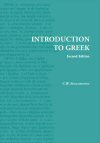
Learn to read the classics with Cynthia W. Shelmerdine’s Introduction to Greek. This text offers a full curriculum for a first-year course in Classical Greek at the university level. The text focuses on grammar and features slightly altered readings drawn chiefly from the works of Xenophon and Herodotus, as well as vocabulary sections at the end of each chapter that build your knowledge of Greek words as you learn grammatical concepts.
Shelmerdine’s book is extremely well laid-out with clear tables and large, easy-to-read text. Her table of contents is incredibly detailed, making it very easy to find each topic.
—Classical Review
Cynthia W. Shelmerdine is the Robert M. Armstrong Professor Emeritus of Classics at the University of Texas. Her research interests include Aegean Bronze Age Archaeology and Mycenaean Greek.
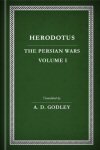
The Persian Wars, vol. 1
- Author: Herodotus
- Translator: A.D. Godley
- Series: Loeb Classical Library
- Publisher: Harvard University Press
- Publication Date: 1920
- Pages: 273
This volume contains A.D. Godley’s English translation of The Persian Wars, volume 1.
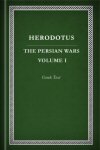
The Persian Wars, vol. 1: Greek Text
- Author: Herodotus
- Translator: A.D. Godley
- Series: Loeb Classical Library
- Publisher: Harvard University Press
- Publication Date: 1920
- Pages: 273
This volume contains the original Greek text of The Persian Wars, volume 1.
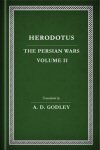
The Persian Wars, vol. 2
- Author: Herodotus
- Translator: A.D. Godley
- Series: Loeb Classical Library
- Publisher: Harvard University Press
- Publication Date: 1921
- Pages: 223
This volume contains A.D. Godley’s English translation of The Persian Wars, volume 2.
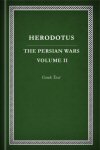
The Persian Wars, vol. 2: Greek Text
- Author: Herodotus
- Translator: A.D. Godley
- Series: Loeb Classical Library
- Publisher: Harvard University Press
- Publication Date: 1921
- Pages: 223
This volume contains the original Greek text of The Persian Wars, volume 2.
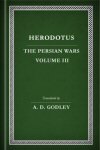
The Persian Wars, vol. 3
- Author: Herodotus
- Translator: A.D. Godley
- Series: Loeb Classical Library
- Publisher: Harvard University Press
- Publication Date: 1922
- Pages: 289
This volume contains A.D. Godley’s English translation of The Persian Wars, volume 3.
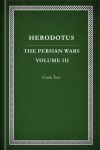
The Persian Wars, vol. 3: Greek Text
- Author: Herodotus
- Translator: A.D. Godley
- Series: Loeb Classical Library
- Publisher: Harvard University Press
- Publication Date: 1922
- Pages: 289
This volume contains the original Greek text of The Persian Wars, volume 3.
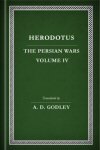
The Persian Wars, vol. 4
- Author: Herodotus
- Translator: A.D. Godley
- Series: Loeb Classical Library
- Publisher: Harvard University Press
- Publication Date: 1925
- Pages: 219
This volume contains A.D. Godley’s English translation of The Persian Wars, volume 4.
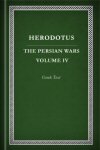
The Persian Wars, vol. 4: Greek Text
- Author: Herodotus
- Translator: A.D. Godley
- Series: Loeb Classical Library
- Publisher: Harvard University Press
- Publication Date: 1925
- Pages: 219
This volume contains the original Greek text of The Persian Wars, volume 4.
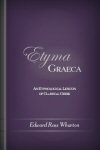
Of the 41,000 words used by Greek authors down to 300 BC about seven-eighths are derivatives or compounds, and their formation is sufficiently explained in Liddell and Scott’s Lexicon. The remaining 5,000 form the subject of the present work, Etyma Graeca: An Etymological Lexicon of Classical Greek. In part one, they are arranged alphabetically, in part two according to the etymological processes involved in them.
Etyma Graeca also includes two important appendixes. Appendix A is a list of the 92 onomatopoeic words found in classical Greek. From the nature of the case no derivation can be sought for these, though many may be paralled in other languages. In Appendix B, the 641 loan-words in classical Greek are arranged as far as possible according to the languages from which they were taken. Most of them are substantives, and denote material objects.
Edward Ross Wharton (1844–1896) earned his BA and MA from Trinity College, Oxford. In 1868, he was elected fellow of Jesus College, Oxford, and was a noted philologist and genealogist.
Herodotus (484–425 BC), born in what is now Turkey, is known as the “Father of History.” He spent most of his life traveling and wrote the most comprehensive historical works from his time, The Histories.